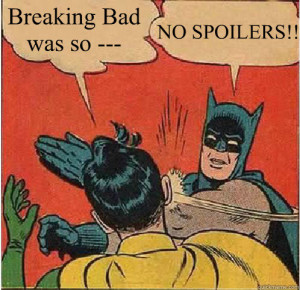Getting back to last night’s episode: in the era of the DVR, not everyone watches a show at the same time, meaning that some people were not interested in discussing “Ozymandias” at the water cooler this morning. In the era of social media, the water cooler discussion has expanded far beyond the water cooler. This raises an interesting question. In social media forums like Facebook, it is relatively easy to post spoiler warnings, but not so much on Twitter. What sort of etiquette, if any, exists to guard against accidentally revealing key plot developments to people who are not ready for them. Conversely, what is the responsibility of the spoilee to avoid discussions that might lead to spoilers? It hardly seems fair to ask people who have seen the episode, in all of its [redacted], to wait to discuss it until everyone has had a chance to see it.
Besides that, how much information about an unseen episode constitutes a “spoiler”? Does it have to be specific information, like night’s episode revelation that the entire story of Walter White was actually the daydream of an autistic child with a snowglobe? Or is it something much simpler, like “Wow, that was intense!!!1!!!!!”
Some people have a bit of fun with others’ aversion to spoilers:
BREAKING BAD SPOILER: This episode was called "Ozymandias" because Walt dropped a giant alien squid onto the rest of the cast
— Emily Crockett (@emilycrockett) September 16, 2013
Other people take spoilers very, very, very seriously, and will tell you all about their level of seriousness, as seen in this exchange I witnessed last night (and Storified, because I’m a dork):
What’s the answer? Even if I knew, no spoilers.



